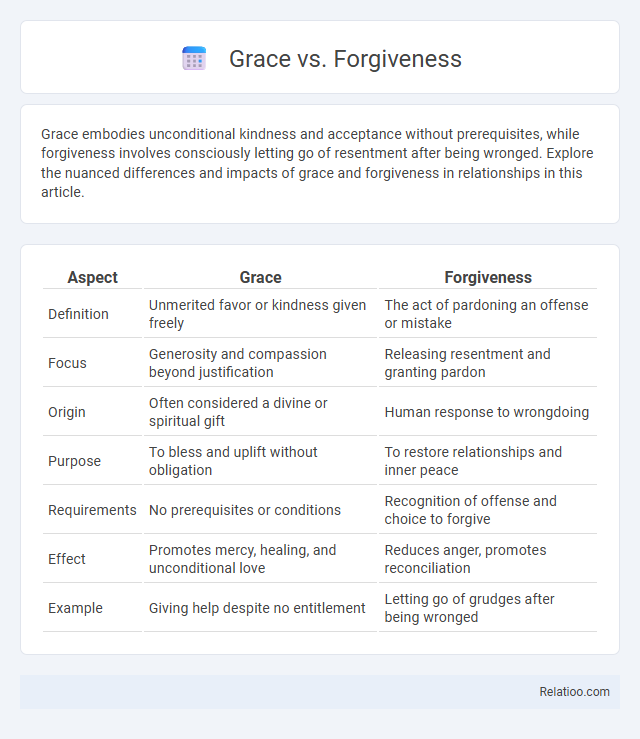Grace embodies unconditional kindness and acceptance without prerequisites, while forgiveness involves consciously letting go of resentment after being wronged. Explore the nuanced differences and impacts of grace and forgiveness in relationships in this article.
Table of Comparison
| Aspect | Grace | Forgiveness |
|---|---|---|
| Definition | Unmerited favor or kindness given freely | The act of pardoning an offense or mistake |
| Focus | Generosity and compassion beyond justification | Releasing resentment and granting pardon |
| Origin | Often considered a divine or spiritual gift | Human response to wrongdoing |
| Purpose | To bless and uplift without obligation | To restore relationships and inner peace |
| Requirements | No prerequisites or conditions | Recognition of offense and choice to forgive |
| Effect | Promotes mercy, healing, and unconditional love | Reduces anger, promotes reconciliation |
| Example | Giving help despite no entitlement | Letting go of grudges after being wronged |
Understanding Grace: A Foundational Concept
Grace represents unmerited favor and unconditional love extended without expectation of repayment or worthiness, serving as a foundational concept in many spiritual traditions. Forgiveness, while related, specifically involves the conscious decision to let go of resentment or judgment toward someone who has caused harm. Understanding grace requires recognizing it as an active, transformative force that empowers individuals to extend compassion beyond human merit or wrongdoing.
The True Meaning of Forgiveness
Forgiveness is the intentional act of releasing resentment and anger toward someone who has caused harm, enabling emotional healing and peace. It differs from grace, which is unmerited favor or kindness extended without conditions, often reflecting divine love. Understanding the true meaning of forgiveness helps you break free from bitterness while embracing compassion and empathy.
Grace vs Forgiveness: Key Differences
Grace and forgiveness are distinct concepts often intertwined in moral and spiritual contexts. Grace refers to unearned favor or kindness extended to someone regardless of their actions, while forgiveness involves the conscious decision to release resentment or judgment towards someone who has wronged You. Understanding the key differences between grace's unconditional benevolence and forgiveness' active choice is vital for personal growth and relational healing.
The Role of Grace in Personal Relationships
Grace in personal relationships fosters unconditional acceptance and compassion, allowing individuals to embrace imperfections without judgment. Forgiveness often follows grace, as it involves consciously letting go of resentment and healing emotional wounds. Your ability to extend grace can transform conflicts into opportunities for growth and deeper connection.
Forgiveness as a Healing Process
Forgiveness is a powerful healing process that allows you to release resentment and pain, restoring emotional balance and promoting mental well-being. Unlike grace, which is a gift often extended unconditionally, forgiveness involves an active decision to let go of hurt and rebuild inner peace. Embracing forgiveness can transform your relationships by fostering empathy and understanding, leading to personal growth and reconciliation.
How Grace Influences Forgiveness
Grace profoundly influences forgiveness by fostering an unconditional acceptance that transcends human flaws and mistakes. Your capacity to extend grace creates a powerful foundation for genuine forgiveness, allowing you to release resentment and promote healing. Embracing grace transforms forgiveness from a mere act into a transformative experience rooted in compassion and understanding.
Practical Ways to Show Grace
Showing grace involves extending kindness and understanding without expecting anything in return, often in challenging situations. Practical ways to show grace include offering patience during conflicts, listening empathetically without judgment, and providing support even when others make mistakes. Acts like forgiving others, giving second chances, and maintaining a calm demeanor foster a culture of grace in personal and professional relationships.
Overcoming Obstacles to Forgiveness
Grace provides a foundation of unconditional love that helps you move beyond resentment and pain, creating space for forgiveness to take root. Forgiveness requires intentional effort to release grudges and heal emotional wounds, often confronting deep-seated obstacles like anger and betrayal. Embracing grace enables overcoming these barriers by fostering empathy and humility, leading to genuine reconciliation and inner peace.
The Psychological Benefits of Grace and Forgiveness
Grace and forgiveness significantly improve psychological well-being by reducing stress and promoting emotional healing. Grace fosters self-compassion and resilience, enabling individuals to accept imperfections without harsh self-judgment. Forgiveness alleviates feelings of anger and resentment, lowering anxiety and enhancing mental health.
Cultivating a Life of Grace and Forgiveness
Cultivating a life of grace and forgiveness involves embracing compassion, empathy, and humility to foster genuine connections and inner peace. Grace embodies unmerited favor and kindness, while forgiveness releases resentment and promotes healing from past wounds. Integrating these principles encourages emotional resilience and spiritual growth, transforming personal relationships and overall well-being.

Infographic: Grace vs Forgiveness
 relatioo.com
relatioo.com